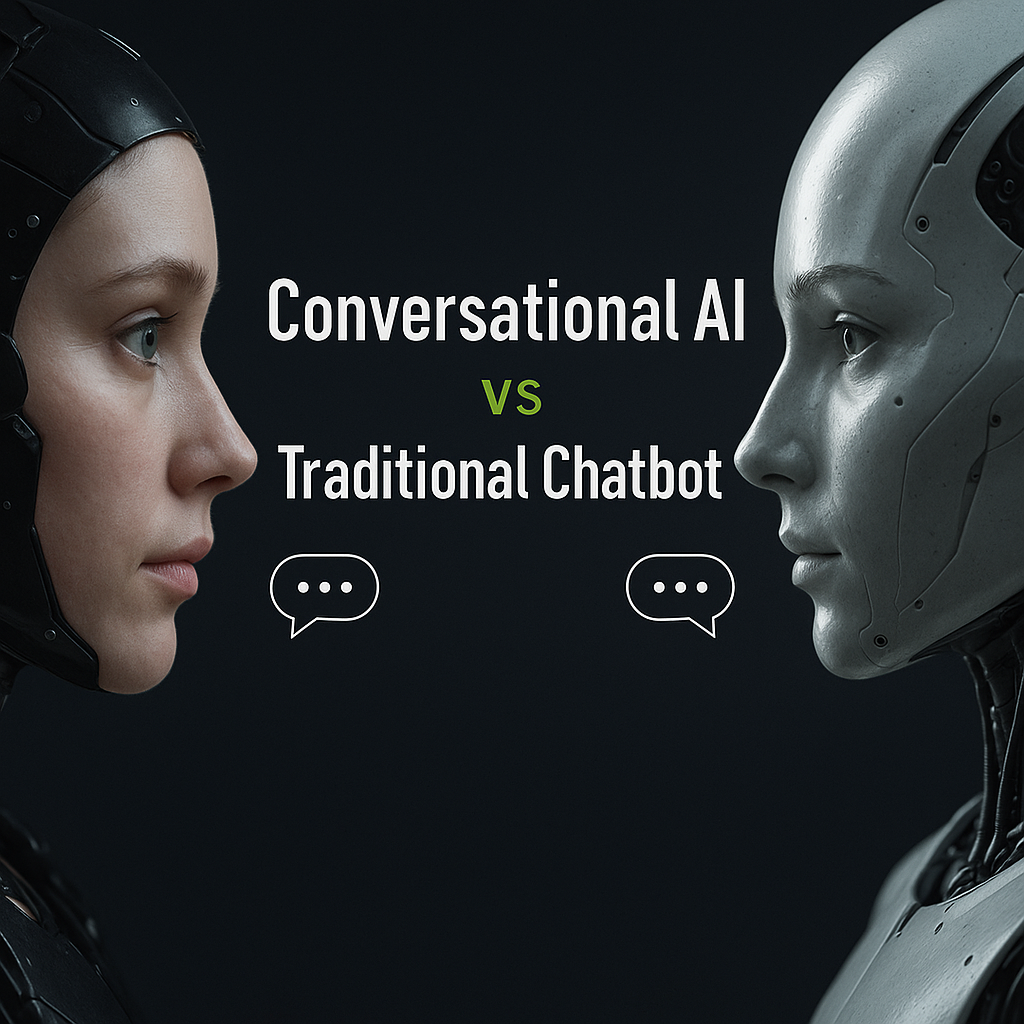Chatbots vs Conversational AI: Which Delivers Better Results?

In today’s fast-changing digital world, conversations are more than just answering questions. They help build trust, create better experiences and support business growth. Companies now understand that the way they talk to customers can make a big difference in loyalty and success.
In this blog, we’ll look at chatbots and conversational AI—what they are, how they work, where they fit best and why it makes a real impact in 2025.
Why This Matters in 2025
Every interaction with a customer is a chance to answer a question, resolve a problem, make a sale. However, many businesses continue to experience problems:
- Basic chatbots fail when the conversation goes beyond simple scripts
- Customers expect faster and more natural responses
- Missed opportunities lead to lower loyalty and lost revenue
This is why businesses are moving from simple chatbot setups to more intelligent conversational AI solutions.
Where Chatbots Still Shine
Chatbots still have a place in modern business operations because they are
- Cost-effective for simple tasks like FAQs, store hours, or order tracking
- Fast to deploy and easy to manage with minimal technical effort
- Reliable for high-volume, low-complexity interactions
- Useful for support triage by directing users to the right resources or departments
Where Chatbots Fall Short
However, chatbots have clear limitations:
- They can’t understand context or intent beyond scripted commands
- They often frustrate users when questions are complex or off-script
- They don’t learn or improve over time
- They cannot create meaningful, personalized experiences
Conversational AI: Smarter Conversations, Better Results
Conversational AI solves many of the problems that hold basic chatbots back. By using natural language processing (NLP), machine learning (ML) and contextual intelligence, it can:
- Understand what customers mean, not just what they type
- Handle complex, multi-step conversations smoothly
- Learn and improve with every interaction
- Offer relevant, personalized responses at scale
How Conversational AI Works
Modern conversational AI turns basic interactions into smart, results-driven conversations. Here’s how:
- Listen – Captures messages from chat, email, voice, or messaging apps
- Understand – Uses AI to detect intent, context, and even emotion
- Respond – Delivers helpful, natural, and personalized replies instantly
- Integrate – Syncs with systems like CRM or support platforms automatically
- Learn – Gets smarter with each conversation, improving performance over time
Key Benefits of Conversational AI
- Grow revenue – Identify upsell and cross-sell opportunities naturally
- Save time and costs – Manage thousands of chats without adding more staff
- Resolve issues faster – Provide accurate answers in seconds, improving first-contact resolution
- Improve customer experiences – Make every conversation feel personal and human
- Gain insights – Use analytics to understand customer needs and improve strategies
Easy Integration with Modern Tools
Conversational AI platforms are designed to integrate directly into the systems that businesses already use. With CRMs like Salesforce, HubSpot and Dynamics 365 and support tools like Zendesk, Freshdesk and ServiceNow - conversational AI platforms connect directly into businesses' existing workflows even communication apps like WhatsApp, Messenger, Slack and Microsoft Teams help facilitate adoption across teams. ESG-founded trust encrypted data in transit and at rest, role-based access, GDPR, HIPPA and CCPA compliance secured APIs, etc. provide safeguards for trusted and compliant integrations.
Proven Business Impact
Conversational AI is already delivering great results. Companies are seeing delivery times reduced by up to 65% and they are seeing lead conversions increases of upwards of 28% in just a few months. Customers experience faster, more personalized interactions and greater engagement. The method to achieve success is easy: begin with one workflow, utilize analytics to optimize it, train teams to incorporate AI insights into their workflows, and review it for efficiency and security regularly.
The Future of Conversational AI
We are still in the early stages of what conversational AI can deliver. Expect to see serious next-generation innovation coming to light with emotion-aware actions that respond consistently to customer tone, increasingly deep personalization for sales and marketing, voice-enabled assistants for hands-free customer support, and predictive AI that can help customers even before they recognize an issue. The future of customer engagement is going to be smarter, faster, and more human than ever before.
The Bottom Line
In 2025, elementary chatbots are still suitable for simple tasks but cannot satisfy consumer demand for smarter, more meaningful conversations. Conversational AI provides the agility, scale and intelligence organizations need to connect better with their customers, resulting in quantifiable growth.
For organizations that want to modernize their customer engagement, the implementation of conversational AI is not a choice, it is the next evolutionary step forward in building smarter, more human connections.
FAQ's
Q1: What is Conversational AI?
Conversational AI is the technology that enables machines to understand and respond to human language in the way people speak. Unlike bot bots it employs NLP, machine learning and context in order to provide smarter and more human responses.
Q2: Is conversational AI just a smarter chatbot?
Not exactly. Chatbots follow rigid scripts conversational AI grasps context, intent and emotion. This facilitates more natural, interactive and helpful conversations for customers.
Q3: How does conversational AI benefit my business?
Conversational AI enables businesses to become more efficient, save on costs and enhance customer experiences. Companies employ conversational AI to automate FAQs and tasks, offer 24/7 support, generate personalized answers, control demand peaks, and free up teams to do more valuable work.
Q4: Is conversational AI safe for sensitive data?
Yes. Enterprise-grade security is built into Conversational AI with encryption, secure APIs and GDPR, HIPAA and CCPA compliance. So it is being used and trusted by finance, health care and government.
Popular Blogs
05 Nov, 2024

